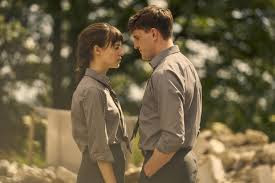 |
| Normal People |
It’s interesting how a week will take on a dominant characteristic of its own. This week for me, it was “Series”. More about some of the movies I watched later, but first I must share my enjoyment with several series I devoured this week. I’m not really a binge-watcher of series, preferring to ration myself to no more than an episode a day of something I’m following. But this week, Normal People landed on Stan, and I finished it all (12 x 30 min episodes) in four days.
This is about Connell and Marianne. We meet them first in their final school year in Sligo, and then share their University Days at Trinity College, Dublin. I’m trying to be as neutral in describing it, because everyone deserves to go into this with no spoilers or expectations. But I was absolutely captivated. Often, I’d be aware I was just smiling aloud (if you can) at and with these two people, so confident in parts of their lives, so fumbling and unsure in others. And one episode had me so teary I had to go for a long socially-isolated walk outside to come back to normal.
Its quality comes from an intense understanding of its two main characters – and all of those around them. We can sense their strengths and insecurities, their fumblings and their confident strides. And the two actors are outstanding, embodying completely all their complexities. The script is beautifully understated and insightful.
I’d read the book about a year back and can remember quite enjoying it. But I soon moved on something else, and really remembered almost nothing about it. This might be one series I will watch again just so I can spend time again with these two terrific people.
 |
| After Life (s2) |
Series apart, I had some good film viewing, too. A Sun was on Netflix, a Taiwanese film from director Chung Mong-Hong released last year. It has a violent opening – and then becomes more introspective, as the repercussions of this event play out, not only on victim and perpetrators, but also on those around them, such as their family and friends. Its slow-burning exploration of grief, thwarted expectations and pain has been compared to two other master Taiwanese directors, Hou Hsiao-hsien and Edward Yang – and it deserves those comparisons.
 Seberg (Benedict Andrews) has already played cinemas here and didn’t excite much interest. This story about Jean Seberg focuses on a few years when her best known films were already behind her, but she was getting the attention of the FBI because of her support for political movements such as the Black Panthers. I was glad to see it, and it is probably not as bad as some of the reviews. But it is also a film that could have been so much better and insightful.
Seberg (Benedict Andrews) has already played cinemas here and didn’t excite much interest. This story about Jean Seberg focuses on a few years when her best known films were already behind her, but she was getting the attention of the FBI because of her support for political movements such as the Black Panthers. I was glad to see it, and it is probably not as bad as some of the reviews. But it is also a film that could have been so much better and insightful.
Last week I excited to rediscover Bo Widerberg on Rarefilm, and so explored another of his films on this channel, Man on the Roof, from 1976. But it’s not a patch on Raven's End. It is an entertaining cop thriller, but almost anonymous. With its central grizzled, middle-age homicide detective it could almost be any Scandi-noir tv series – or several of any Brit. series too. The climactic final section is well-staged, without
Then there was a film that came to me via someone who got a copy under the counter from a source that said it came in the back door after falling off a truck somewhere. The viewing copy did have more than a fair share of rolling streamers and watermarks. But it was still great to have a chance to get a preview of Christian Petzold’s latest film Undine. This premiered at this year’s Berlin Festival, and who knows when or where it will surface again in the lockdown world.
The few reviews have generally expressed disappointment. It doesn’t inhabit that world of politics or history that we recognise from his earlier films. Rather, it helps to remember the myth of the Undine, mysterious beings in the water, most likely female, resembling mermaids, they can only gain a human soul and mortality by marrying a human. And if that human betrays her, pity help him!
 |
| Christian Petzold |
As a post-script, and actually doing some afternoon viewing, I watched one of the Met Operas, one of the many performances being streamed free around the world at the moment. This was Marnie. I had seen this a few years back when it was doing the Met Opera Screening circuit shortly after its premiere in New York. It’s a fascinating work – and what a thrill to be able to see it again, to be reminded of how successful it is in translating to the opera world, the novel that Hitchcock translated to the cinema. You keep remembering Hitchcock’s images – but you’re more than satisfied with these alternate ways of expressing those moments.
 |
| Marnie, Met Opera production |
No comments:
Post a Comment
Note: only a member of this blog may post a comment.